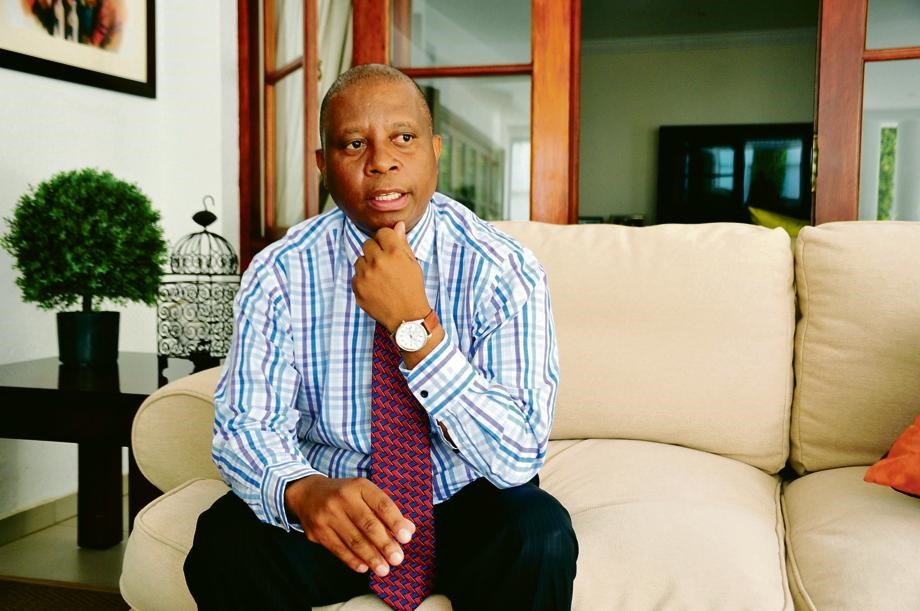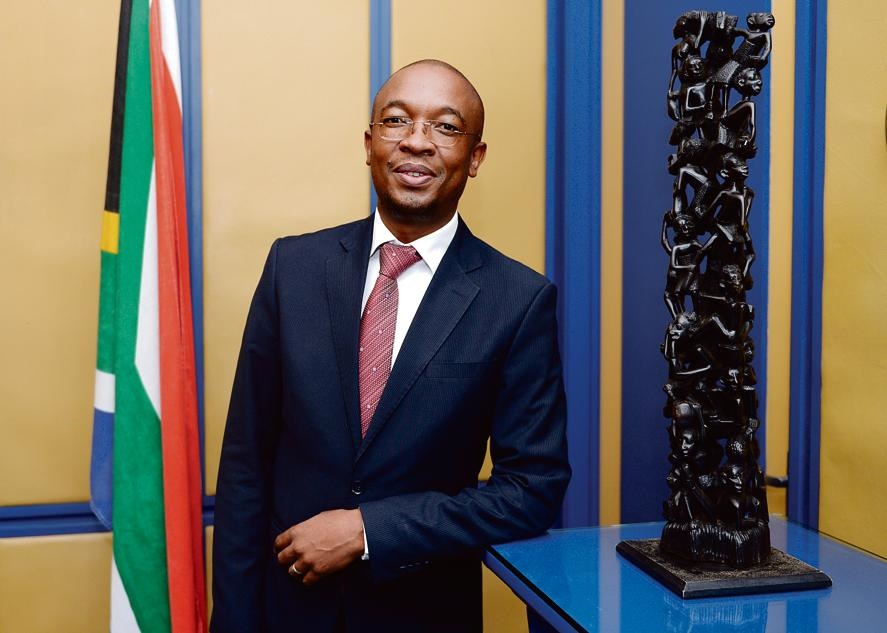Parks Tau and Herman Mashaba make a pitch for your vote by respectively outlining an existing record of service and a future vision
Herman Mashaba, DA mayoral candidate for Joburg
For a time, we saw progress, delivery of basic services, infrastructure and housingin the city. However, today that has stalled. Corruption is rife and service delivery is no longer meeting people’s needs. This disturbs me. Jobs are no longer being created to give people hope and a future, and I see growing despair. I am running for mayor on a vision to make Johannesburg Africa’s leading business capital and job creator. These are the 10 things I will do immediately on entering office:
. One: Under the DA, the City of Johannesburg will target growth of up to 5% by 2017. We’ll audit all city-owned land and buildings to kick-start an economic revival. Unused buildings will be put to use in place of expensive leases, and free space will be made available to small business and entrepreneurs. Small businesses will receive preferential and specialised treatment, such as rebates and low rents. Bylaws obstructing business will be reviewed and amended within 100 days. To bolster real, broad-based empowerment, large supply chain and procurement tenders will be carved up into smaller contracts, so that small businesses can compete for them fairly and transparently. We will implement an open tender system.
. Two: A free basket of basic services will be made available to residents who cannot afford to pay. We’ll upgrade informal settlements. We will provide dignified sanitation, upgraded sewerage infrastructure, and reliable water and electricity. We’ll innovate with ideas such as “Brick Skin” projects to keep people warm and insulated in the winter. We’ll bolster fire prevention through community firefighters on the township streets and fire-sensor devices.
. Three: Introducing a single-ticket system for all will ensure the poor have easy access to quality public transport and job opportunities. The city’s transportation technology and operational management will be streamlined.
. Four: Hijacked buildings will be upgraded into proper homes, slumlords will be targeted, and occupants will be treated firmly and compassionately – not turfed out by the Red Ants. Law and order will rule Johannesburg. Safety and security data will be centralised to improve local policing and identify druglords and gangs. We will implement digital technology to spot anomalies and pattern shifts to prevent crime and corruption. We’ll stop corruption in the Metro police by beefing up an integrity and internal investigations unit that will be accountable to the people through the mayor and open council committees. It will fast-track internal discipline. Criminal charges against corrupt officers will be pursued. We’ll protect the police and keep them safe with body and vehicle dashboard cameras, so that they can keep us safe.
. Five: We’ll solve the housing crisis by approving ownership as quickly as possible, so that poor citizens can get their title deeds, own their own homes and be empowered to access funds to establish their own businesses. We’ll undo housing-list corruption by making the process transparent, open and viewable by all. An integral component of every smart city strategy is the reversing of inner-city decay. Johannesburg has beautiful and iconic buildings. We’ll work with urban experts and developers to revive downtown Johannesburg as a commercial hub, with mixed housing for all incomes, green public spaces, safe streets, fun playgrounds, urban food gardens and a lively arts scene.
. Six: Using the economies of scale of local government, we will connect our poorest residents to learning and adult apprenticeship and mentoring opportunities. We’ll establish “schools to skills” programmes for teenagers. Here, school-leavers will be trained in how to handle the world of a business-leading city economy.
. Seven: Working with the private sector, we’ll establish early-learning daycare centres in every township where children will receive a nutritious meal, love and a basic preschool education. By preparing our children spiritually and mentally for the world, we’ll break the back of apartheid’s legacy.
. Eight: I will unveil my Service with Pride vision because I will not be able to drive change unless our public servants are inspired to make Johannesburg Africa’s leading city of opportunities. The DA wants city officials to be proud of being in service.
. Nine: We’ll undertake a swift audit of all officials’ skills to allocate expertise and institutional knowledge where it is needed most, and to identify the capacity gaps that need to be filled. Roving service-delivery teams will monitor residents’ satisfaction with basic services.
. Ten: The Internet of Everything will determine the future of successful cities. By 2021 we will develop a customised software-defined network. All aspects of the city’s infrastructure will be connected. By centralising city data, we will improve service delivery, from repairing potholes to saving energy.
Parks Tau, executive mayor for Joburg
Just as my term of office as executive mayor draws to a close, I can safely reflect on a metropolitan municipality showing clear signs of transformation as a truly post-apartheid city. This is as the blend of smart management and innovative policies designed to confront its spatial and socioeconomic transformation challenges begin to show tangible results – and even the world has taken notice.
It is clear no government entering power towards the end of the first decade of this century has had an easy time of it. Any vulnerability in financial systems at any level could buckle under the pressures of the global financial crisis and its sovereign debt aftershocks.
The City of Johannesburg was stable at one level, having worked out the institutional legacy of combining 15 different local authorities over the preceding decade and a half. However, the city was badly rocked by the economic downturn and some rough transitional hiccups that arose in modernising and consolidating our operational systems. Our roads and power distribution grid were crying out for investment at precisely the time that variables beyond our control, such as the bulk cost of water and electricity, were shooting up and putting the affordability of our tariffs in jeopardy.
In 2011 the city committed to an unapologetic spatial and socioeconomic transformation agenda – to move beyond the limiting patchwork of race- and class-based ghettos. These were anchored on transport and housing costs that enforced divisions once maintained by the apartheid pass laws. But this status quo lost its place in South Africa at the dawn of democracy in 1994.
It was in 2011 that the city laid the foundation to accelerate the creation of pathways to prosperity for its citizens in the process of growing the city’s economy in both its established and township incarnations. The radical ramp-up in creating opportunity pathways for small enterprises was activated.
From the precarious status of 2011, Johannesburg now boasts a working cash surplus of more than R3 billion per year against a R60 billion budget. Between 2013 and 2015, the city resoundingly beat both local and global trends. We increased our credit rating, reflecting the full, considered faith of international ratings agencies that the city is both well managed and capable of meeting its obligations. This is also reflected in three years of unqualified audits.
This is as a result of the largest, most ambitious and most targeted capital programme in the nation. The spending focus has been on our roads and power grid, which were straining. The city has been focused on leading private sector investment into our spatial redesign programme, the Corridors of Freedom. Public spend creates enabling conditions for mixed-use, mixed-income development along public transit routes. It is here that we are boldly defying not only Hendrik Verwoerd, but his apartheid social engineers. Joburg is on its way to breaking down the tyranny of six decades of skewed urban development. Integrated economic nodes linked to public transport and close to livelihood opportunities are the right vision, and we are seeing it come to life.
As the city’s Jozi@Work programme matures and fulfils its promise to bootstrap local community enterprises as producers of municipal services, more than 900 cooperatives and small enterprises are providing profit-share and earning opportunities for more than 7 500 residents, above and beyond the almost 5 000 SMMEs supported by the city and 177 000 public works opportunities.
Our Jozi My Beginning community innovation fund has taken the logic of Jozi@Work to the next level – drawing on the ingenuity and energy of Johannesburg citizens to confront local problems with clever new social enterprises. Up to 17 of these innovations have already been identified from more than 2003 submissions – in areas ranging from waste management to road surfacing, from traffic lights to cable theft and even shack-fire prevention. These innovations have entered active development with help from our partners at the University of Johannesburg’s Resolution Circle.
As we widen the paths to prosperity for all, the 800 000-plus economically disengaged youth in Johannesburg have been a particular focus – with our ground-breaking Vulindlel’eJozi partnership with the Harambee Youth Employment Accelerator. Already this initiative has broken down barriers to various opportunities for more than 30 000 young people through a placement network of more than 250 companies.
Vulindlel’eJozi offers extensive entry-level jobseeker support, as well as state of the art, demand-led vocational training and foundation skills training. These are offered through the city’s Massive Open Online Varsity centres attached to local public libraries. The centres use a combination of local content, partnerships with corporates and international academic institutions to develop and bridge the youth skills gap.
Knowing no strategy survives collision with reality entirely, there is pride and value in knowing the city has not just pronounced on, but implemented, a range of status-shaking interventions that are transforming Johannesburg for the better.
TALK TO US
Who will you be voting for in the municipal elections and why?
SMS us on 35697 using the keyword MAYOR and tell us what you think. Please include your name and province. SMSes cost R1.50




 Publications
Publications
 Partners
Partners










